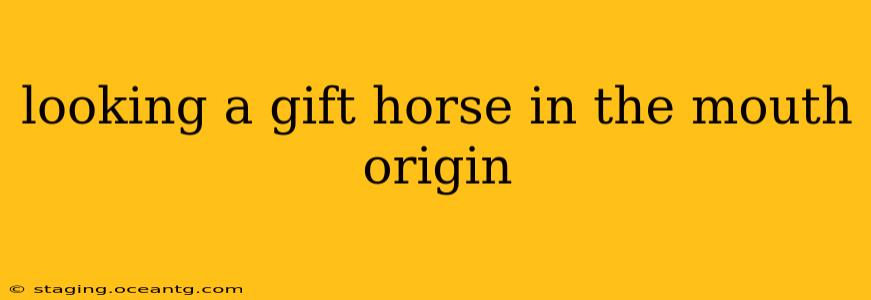The proverb "Don't look a gift horse in the mouth" advises against being overly critical or ungrateful when receiving a gift. But where did this peculiar saying originate? Its roots lie deep in history, connecting to ancient practices of assessing a horse's age and worth. Understanding this historical context reveals the true wisdom behind the proverb's enduring popularity.
What Does "Looking a Gift Horse in the Mouth" Mean?
The phrase implies scrutinizing a gift too closely, thereby showing ingratitude and disrespect towards the giver. It's a warning against focusing on the potential flaws or shortcomings of a freely given present instead of appreciating the gesture itself. Essentially, it encourages acceptance and gratitude over critical analysis in the context of a gift.
The Origin of the Proverb: Assessing Horse Age
The expression's origin stems from the historical practice of examining a horse's teeth to determine its age. The teeth of a horse naturally wear down with age, and experienced horse traders could gauge a horse's age and hence its value by carefully inspecting its teeth. "Looking a horse in the mouth" therefore meant assessing its worth, often critically, before purchase. This practice was particularly important in transactions where the horse's value and working life were central concerns.
Why This Became a Proverb: Gratitude vs. Valuation
The proverb's meaning shifts when applied to gifts. In a gift-giving context, "looking a gift horse in the mouth" signifies an inappropriate level of scrutiny. It's seen as ungracious to meticulously examine a gift for faults or imperfections, especially if it's a generous gesture from someone with goodwill. The proverb highlights the importance of appreciating the generosity of the giver above the perceived value or quality of the gift itself.
Why is it important not to look a gift horse in the mouth?
This proverb isn't about accepting anything. It's about appreciating the gesture of giving. It cautions against being overly critical or ungrateful when someone offers something out of kindness. Overly critical assessment, even of a potentially less-than-perfect gift, can damage relationships and create negative feelings.
What if the gift is unsuitable or unwanted?
Even if a gift is not exactly to your liking, the proverb still holds weight. Instead of openly criticizing or rejecting the gift, expressing polite gratitude while subtly redirecting the gift or quietly disposing of it is a more tactful approach. Directly criticizing the gift can hurt the giver's feelings and damage your relationship.
Is it always appropriate to accept a gift?
There are exceptions, and this depends heavily on context and cultural norms. Accepting a gift that feels inappropriate or potentially compromises your values should be carefully considered. However, the essence of the proverb lies in appreciating the thought behind the gesture even if you don't need or want the item itself.
What are some other ways to express gratitude for a gift?
Beyond simply saying "thank you," show your appreciation by using the gift (if appropriate), expressing sincere interest in the giver’s choice, or reciprocating with a thoughtful gesture of your own. A handwritten thank-you note is always a good option.
In conclusion, "Don't look a gift horse in the mouth" is more than just a quirky expression; it's a timeless piece of wisdom that emphasizes the importance of gratitude, tact, and maintaining positive relationships. Its origins in the practical world of horse trading offer a compelling explanation for its lasting relevance in our modern lives.
